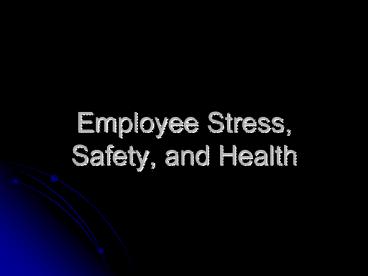Employee Stress, Safety, and Health - PowerPoint PPT Presentation
1 / 19
Title:
Employee Stress, Safety, and Health
Description:
Employee Stress, Safety, and Health ... D) Stress Management at Work. Employee Assistance Program (EAP) Methods of Stress Management ... – PowerPoint PPT presentation
Number of Views:239
Avg rating:3.0/5.0
Title: Employee Stress, Safety, and Health
1
Employee Stress, Safety, and Health
2
- In the early years of the twentieth century
stress and the health and safety of workers were
not areas of concern in I/O Psychology. In the
era of scientific management people were thought
of as extensions of the machinery they operated.
The Hawthorne Western Electric Studies changed
this basic assumption and looked at workers as
complex human beings with emotional and social
needs as well as physical needs. This chapter
looks at the development of concern about stress,
health, and safety of employees and current
applications of research in this field.
3
I. Employee Stress, Safety, and Health
- Stress In the Workplace
- Stress- The physical and/or psychological
response to the demands made on a person. Stress
usually is perceived as something undesirable. - The cost of stress in the workplace in the U.S.
is estimated at about 200 billion to 300
billion annually. Those costs include
absenteeism, diminished productivity, employee
turnover, accidents, direct medical, legal, and
insurance fees and workers compensation awards.
So, it makes good business sense to manage stress
at work and reduce those costs.
4
A) Stress and Productivity
- Stressors- The characteristics or conditions that
lead to stress. - Eustress- Stress that arises from a positive
experience. - Distress- Stress that arises from a negative
experience.
5
B) Consequences of Stress
- Organizational Outcomes
- Absenteeism
- Tardiness
- Low Performance
- Sabotage
- Accidents
6
B) Consequences of Stress
- 2) Personal Outcomes
- Karoshi
- General Adaptation Syndrome
- Fight-or-Flight Response
7
C) Contributors to Stress
- Organizational Contributors to Stress
- Work Overload
- Work Underload
- Role Ambiguity
- Role Conflict
- Technostress
- Sexual Harassment
8
Types of Sexual Harassment
- Gender Harassment
- Seductive Behavior
- Sexual Bribery
- Sexual Coercion
- Sexual Imposition
9
C) Contributors to Stress
- 2) Personal Contributors
- Life Changes
- Divorce
- Marital separation
- Imprisonment
- Death of family member
- Marriage
- Fired from job
- Death of spouse
- Marital reconciliation
- Pregnancy
- Retirement
- Sexual difficulties
- Gain of new family member
- Major business adjustment
- Death of close friend
- Change to a different career
- Buying a house
- Trouble with in-laws
- Beginning or ending formal school
- Trouble with boss
- Change in residence
- Change in eating habits
- Vacation
- Minor violation of the law
10
- Type A Personality
- Type B Personality
- Polyphasic
- Negative Affectivity
- Hardiness
- Burnout
11
D) Stress Management at Work
- Employee Assistance Program (EAP)
- Methods of Stress Management
- Exercise
- Meditation
- Relaxation
- Cognitive Approaches
- Time Management
- Goal Setting
12
II. Safety In the Workplace
- Occupational Safety and Health Administration
(OSHA) The federal government agency that
oversees the health and safety of employees at
work. The concern for safety in the workplace is
a rather recent development. In 1971 legislation
passed the OSHA Act.
13
A) Accidents, Injuries, and Illness at Work
- Defining Accidents- The most important criterion
for determining an accident at work is time lost
from work. - Factors of Organizational Contributors
- Physical Environment
- Noise
- Illumination
- Repetitive Motion Injury
- Shift Work
- Sick Building Syndrome (SBS)
- Mass Psychological illness
14
- 3) Personal Contributors
- Accident Proneness
- Accident Liability
- Job Demand VS. Work Capability Theory
15
B) Reducing and Preventing Accidents and Injuries
at Work
- 1) Design Factors
- Exclusion Design
- Prevention Design
- Fail-Safe Design
2) Human Factors
- Selection Process
- Employment Reliability Inventory
- Traning
- Safety Programs
16
C) Workplace Violence
- Prevention
- Screen employees for potential problems
- Making changes in the physical environment of
the - workplace
- Safety awareness training for all employees
17
Six Factors that increase risk of homicide in the
workplace
- Exchange of money with the public
- Working alone or in small numbers
- Working late-night or early morning hours
- Working in a high crime area
- Guarding valuable property or
- possessions
- Working in a community setting
18
- 2) Crisis Teams
- If violence occurs in the workplace,
organizations should have plans for trained
crisis teams to deal with the violence and its
aftermath.
19
Employee Stress, Safety, and Health
- Organizations that make a strong commitment to
the health and safety of their employees are
viewed as for more desirable places to work and
are able to hire and keep the best employees .

